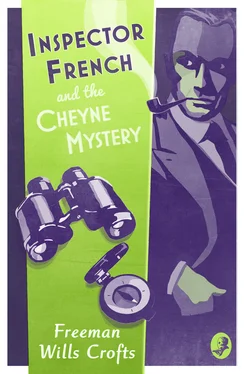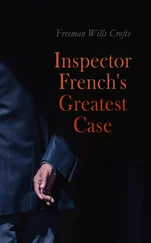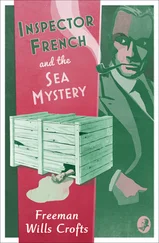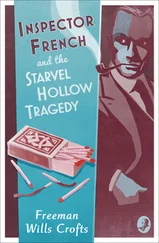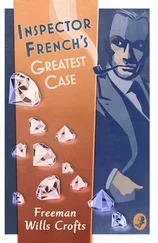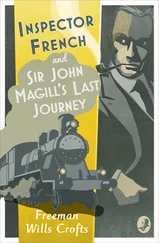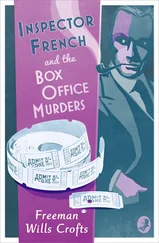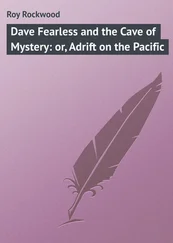1 ...6 7 8 10 11 12 ...15 They climbed down into a small dinghy and Lamson, taking the oars, pulled out towards a fair-sized motor launch which lay at anchor some couple of hundred yards from the shore. She was not a graceful boat, but looked strongly built, showing a high bluff bow, a square stern and lines suggestive of speed.
‘A sea boat,’ said Cheyne approvingly. ‘You surely don’t run her by yourself?’
‘No, a motoring friend has been giving me a hand. I am skipper and he engineer. We hug the coast, you know, and don’t go out if it is blowing.’
As he spoke he pulled round the stern of the launch upon which Cheyne observed the words ‘Enid, Devonport.’ At the same time a tall, well-built figure appeared and waved his hand. Lamson brought up to the tiny steps aud a moment later they were on deck.
‘Mr Cheyne has come out to see the great invention, Tom. I almost hope that he is interested. My friend, Tom Lewesham, Mr Cheyne.’
The two men shook hands.
‘Lamson thinks he is going to make his fortune with this thing, Mr Cheyne,’ the big man remarked, smiling. ‘We must see that there is no mistake about our percentages.’
‘If you want a percentage you must work for it, my son,’ Lamson declared. ‘Mr Cheyne must be back by six, so get your old rattle-trap going and we’ll run down to the sea. If you don’t mind, Mr Cheyne, we’ll get under way before I show you the machine, as it takes both of us to get started.’
‘Right-o,’ said Cheyne. ‘I’ll bear a hand if there’s anything I can do.’
‘Well, that’s good of you. It would be a help if you would take the tiller while I’m making all snug. There’s a bit of a tumble on outside.’
The boat was certainly a flier. The charmingly situated old town dropped rapidly astern while Lamson ‘made snug.’ Then he came aft, shouted down through the engine-room skylight for his friend, and when the latter appeared told him to take the tiller.
‘Now, Mr Cheyne,’ he went on, ‘now comes the great moment! I have not fixed the apparatus up here in front of the tiller, partly to keep it secret and partly to save the trouble of making it weatherproof. It’s down in the cabin. But you understand it should be up here. Will you come down?’
He led the way down a companion to a diminutive saloon. ‘It’s in the sleeping part, still forward,’ he pointed, and the two men squeezed through a door in the bulkhead into a tiny cabin, lit by electric light and with a table in the centre and two berths on either side. On the table was a frame on the top of which was stretched a chart, and a light rod ran out from one side to a pointer fixed over the middle of the chart.
‘You can see that it’s very roughly made,’ Lamson went on, ‘but if you look closely I think you’ll find that it works all right.’
Cheyne bent forward and examined the machine, and as he did so mystification grew in his mind. The chart was not of the estuary of the Dart, nor, stranger still, was it connected to rollers. It was simply tacked on what he now saw was merely the lid of a box. How it was moved he couldn’t see.
‘I don’t follow this,’ he said. ‘How do you get your chart to move if it’s nailed down?’
There was no answer, but as he swung round with a sudden misgiving there was a sharp click. Lamson had disappeared and the door was shut!
Cheyne seized the handle and turned it violently, only to find that the bolt of the lock had been shot, but before he could attempt further researches the light went off, leaving him in almost pitch darkness. At the same moment a significant lurch showed that they were passing from the shelter of the estuary into the open sea.
He twisted and tugged at the handle. ‘Here you, Lamson!’ he shouted angrily. ‘What do you mean by this? Open the door at once. Confound you! Will you open the door!’ He began to kick savagely at the woodwork.
A small panel in the partition between the cabins shot aside and a beam of light flowed into Cheyne’s. Lamson’s face appeared at the opening. He spoke in an old-fashioned, stilted way, aping extreme politeness, but his mocking smile gave the lie to his protestations.
‘I’m sorry, Mr Cheyne, for this incivility,’ he declared, ‘and hope that when you have heard my explanation you will pardon me. I must admit I have played a trick on you for which I offer the fullest apologies. The story of my invention was a fabrication. So far as I am aware no apparatus such as I have described exists: certainly I have not made one. The truth is that you can do me a service, and I took the liberty of inveigling you here in the hope of securing your good offices in the matter.’
‘You’ve taken a’ bad way of getting my help,’ Cheyne shouted wrathfully. ‘Open the door at once, damn you, or I’ll smash it to splinters!’
The other made a deprecatory gesture.
‘Really I beg of you, Mr Cheyne,’ he said in mock horror at the other’s violence. ‘Not so fast, if you please, sir. I have an answer to both your observations. With regard to the door you will—’
Cheyne interrupted him with a savage oath and a fierce onslaught of kicks on the lower panels of the door. But he could make no impression on them, and when in a few moments he paused breathless, Lamson went on quietly.
‘With regard to the door, as I was about to observe, it would be a waste of energy to attempt to smash it to splinters, because I have taken the precaution to have it covered with steel plates. They are bolted through and the nuts are on the outside. I mention this to save you—’
Cheyne was by this time almost beside himself with rage. He expressed his convictions and desires as to Lamson and his future in terms which from the point of view of force left little to be desired, and persistently reiterated his demand that the door be opened as a prelude to further negotiation. In reply Lamson shook his head, and remarking that as the present seemed an inopportune moment for discussing the situation, he could postpone the conversation, he closed the panel and left the inner cabin once more in darkness.
For an hour Cheyne stormed and fumed, and with pieces which he managed to knock off the table tried to break through the door, the bulkheads and the deadlighted porthole, all with such a complete absence of success that when at last Lamson appeared once more at the panel he was constrained to listen, though with suppressed fury, to what he had to say.
‘You see, it’s this way, Mr Cheyne,’ the erstwhile inventor began. ‘You are completely in our power and the sooner you realise it and let us come to business, the sooner you’ll be at liberty again. We don’t wish you any harm; please accept my assurances on that. All we want is a slight service at your hands, and when you perform it you will be free to return home; in fact we shall take you back as I said, with profuse apologies for your inconvenience and loss of time. But it is only fair to point out that we are determined to get what we want, and if you are not prepared to come to terms now we can wait until you are.’
Cheyne, still at a white heat, cursed the other savagely. Lamson waited until he had finished, then went on in a smooth, almost coaxing tone:
‘Now do be reasonable, Mr Cheyne. You must see that your present attitude is only wasting time for us both. Not to put too fine a point on it the situation is this: You are there, and you can’t get out, and you can’t attract attention to your predicament—that is why the deadlights are shipped. It grieves me to say it,’ Lamson smiled sardonically, ‘but I must tell you that you will stay there until you do what we want. In order to prevent Mrs Cheyne becoming uneasy we shall wire her in your name that you have left for an extended trip and won’t be back for some days. “To Cheyne, Warren Lodge, Dartmouth. Gone for yachting cruise down French coast. Address Poste Restante, St Nazaire. All well. Maxwell.” You see, we know exactly how to word it. All suspicion would be lulled for some days and then,’ he paused and something sinister and revolting came into his face, ‘then it wouldn’t matter, for it would be too late. For you see there is neither food nor drink in the cabin and we don’t propose to pass any in. You won’t get any, Mr Cheyne, no matter how many days you remain aboard: that is,’ his manner changed, ‘unless you are reasonable, which of course you will be. In that case no harm is done. Now won’t you hear our little proposition?’
Читать дальше
